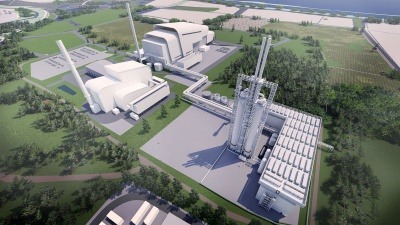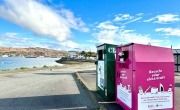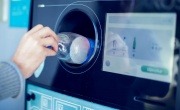UK EfW operators vying to launch first CCS installations
Carbon capture plans announced this week by Encyclis and Viridor follow hot on the heels of plans revealed by Suez, Veolia and enfinium.

Already in 2024, Veolia has stated it is conducting a feasibility study for a pilot project that aims to use carbon capture processes to produce fuels, and enfinium has launched a partnership with Hitachi Zosen Inova to install a carbon capture pilot at its Ferrybridge-1 facility. All claiming to be first in deploying their CCS technology.
With the prospect of emissions from EfW being included in the UK Emissions Trading Scheme from 2028, the major companies in the sector are all now ramping up efforts to demonstrate the feasibility of removing carbon dioxide resulting from the treatment of residual waste.
This week, Viridor has announced a CCS initiative at its Runcorn Energy Recovery Facility (ERF), described as the UK's first negative emissions project. This project, on which the company has reached an agreement of principles with the Department for Energy Security and Net Zero (DESNZ), plans to capture over 900,000 tonnes of CO2 annually. The Runcorn CCS project will be part of the HyNet North West industrial cluster aimed at decarbonization through carbon capture and hydrogen technologies.
Tim Rotheray, Viridor's Chief Sustainability Officer, commented on the project's significance: "[This] announcement is a great next step in our ambitious plans to transform our business, building on our sector leading commitment to be climate positive by unlocking negative emissions from this essential waste management process. This project is a testament to what the Government and private sector can achieve by working in partnership. Today marks the next stage in this exciting and ambitious journey towards being truly Net Zero, delivered for and working alongside the communities within which we operate.”
The project is expected to generate more than 500 jobs during its design and construction phases and create 135 full-time jobs in its operational and maintenance phases. It's also anticipated to draw in around £3 billion of private investment in the area.
Close on the heels of Viridor, Encyclis has moved into the final negotiation stages with the Department for Energy Security and Net Zero (DESNZ) regarding its carbon capture facility at the Protos Energy Recovery Facility (ERF) near Ellesmere Port, Cheshire. This step marks progress in Encyclis's plans to ‘develop the UK’s first energy-from-waste facility with carbon capture’.
The agreement, formalised through a Statement of Principles with DESNZ, positions the company to advance its project, designed to capture around 350,000 tonnes of CO2 annually. The captured CO2 is planned to be transported via the HyNet pipeline for storage in depleted gas fields in Liverpool Bay. This initiative not only aims to reduce atmospheric CO2 but also supports the UK's broader net-zero ambitions by transforming unrecyclable waste into baseload electricity and facilitating resource recovery.
Owen Michaelson, CEO of Encyclis, commented: “The announcement of a Statement in Principle for this first EfW carbon capture plant represents a huge milestone for a project that we’re extremely proud to be driving forward with our partners. The progression of this project will be a big win for UK PLC and should help create significant competitive advantage for UK industry by delivering the knowhow, the IP and new supply chain opportunities in our industrial heartlands.”
The Protos ERF, currently under construction and jointly developed by Encyclis and Biffa, will process up to 400,000 tonnes of non-recyclable waste once operational and is expected to generate up to 49MW of electricity, sufficient to power around 90,000 homes.
Earlier announcements in the race
In March, EfW operator enfinium announced plans for the UK’s first carbon capture pilot for energy from waste at its Ferrybridge-1 facility in West Yorkshire, in collaboration with Hitachi Zosen Inova (HZI). The pilot aims to capture one tonne of CO2 daily, marking a key step towards utilising carbon capture and storage (CCS) technology on a larger scale within the waste management sector.
According to enfinium, the pilot will be operational from July 2024, focusing on testing various amine solvents to evaluate their CO2 capture efficiency, energy consumption, and solvent stability over time. This initiative is part of enfinium's broader strategy to invest significantly in CCS technology, with plans to capture over 1.2 million tonnes of CO2 annually at its Ferrybridge 1 & 2 facilities.
In February, Veolia said it had initiated a feasibility study for a carbon capture project at its Energy Recovery Facilities (ERF) in the UK, with the goal of producing sustainable fuels. This project focuses on capturing CO2 emissions from the combustion of non-recyclable biogenic waste, which constitutes approximately 60 per cent of the emissions from waste incineration processes. The captured CO2, using Advanced Amine technologies, is planned to be combined with green hydrogen to create fuels like eMethanol and Sustainable Aviation Fuel, to reduce carbon emissions in the marine and aviation sectors.
This carbon capture, utilisation, and storage (CCUS) project is expected to allow Veolia’s ERFs to achieve carbon savings exceeding 100,000 tonnes annually. Donald Macphail, Veolia's Chief Operating Officer - Treatment, commented: “This latest innovation marks a major step forward in our ability to utilise non-recyclable waste and captured CO2 to create the next generation of fuels. This development, combined with greater recycling and the removal of plastics from waste streams, will further reduce carbon emissions from ERF. It will also make a major contribution to meeting Net Zero targets that protect the environment for the future, and supports our commitment to achieve ecological transformation.”
In 2022, SUEZ announced that it was consulting on plans to build a new carbon capture plant adjacent to its facility in Billingham, aligning with the East Coast Cluster CCS project, with plans to commence construction in 2025. According to the company at the time, this initiative is designed to remove more than 90 per cent of the CO2 emissions from the existing EfW facility, capturing 240,000 tonnes of carbon annually.






